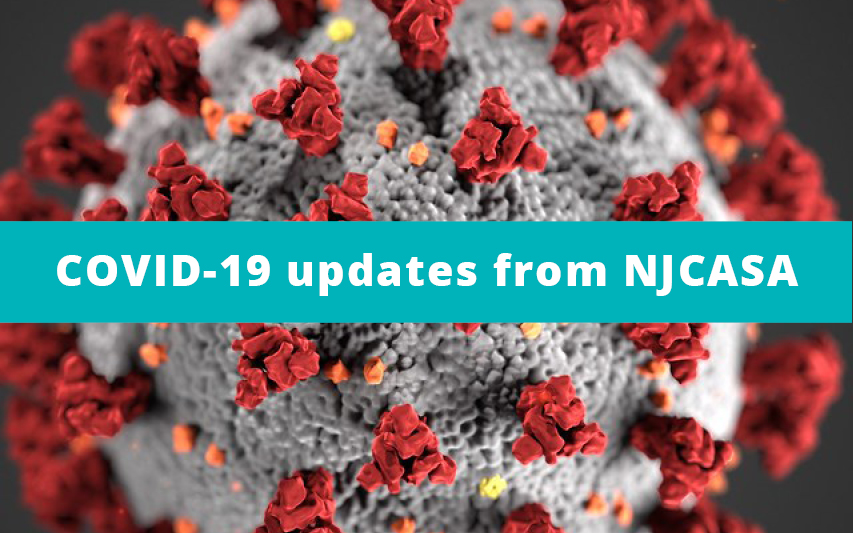Home » COVID-19

UPDATED ON: APRIL 8, 2020 WITH NEW INFORMATION REGARDING PROTECTIVE ORDERS UNDER SASPA
We know that we are working in unprecedented times. The widespread impact of COVID-19 has caused sexual violence service providers throughout the state to rethink how they can best meet the needs of their communities.
NJCASA is working diligently with New Jersey’s sexual violence programs to continue supporting survivors in this ever-changing landscape.
Please rest assured: our commitment to serving survivors of sexual violence does not change. However, the way that New Jersey’s county-based sexual violence programs provide services will look different.
If you are in an emergency situation, call 9-1-1.
For support and information, you can speak to an advocate by calling New Jersey’s confidential, statewide sexual violence hotline: 1-800-601-7200.
If you have been assaulted, you can still go to a hospital and have evidence collected and preserved in a rape kit. Physical evidence can be collected up to five days after an assault.
Due to new hospital procedures to prevent the spread of COVID-19, you may not be able to have face-to-face contact with a Confidential Sexual Violence Advocate (CSVA). However, CSVAs are still available via phone or videoconferencing and will be able to offer you guidance and assistance.
If you would like more information about how CSVAs are working with survivors in your county, please contact your local sexual violence service provider. Virtual support groups are also available at this time—find available ones here.

Programs are currently adapting to virtual options for counseling and therapy. If you have a private space where you can talk, you might be able to access counseling and therapy remotely. Your local sexual violence program will have information on the availability of remote counseling/therapy sessions.
As of March 18, 2020, and until further notice, the New Jersey court system announced that there are no in-person criminal or family court proceedings. New Jersey courts will be handling as many hearings as possible via telephone and videoconferencing. Information is changing rapidly. Before reporting to court, please check the New Jersey Courts website for the latest COVID-19 operating procedures.
While the collection of some forensic evidence is time limited, it is important to know that there is no criminal statute of limitations for sexual assault. That means you can bring criminal charges against the person who assaulted you at any time. While evidence from the assault may help in the eventual prosecution of a case, the inability to conduct a forensic exam does not prevent a survivor from filing criminal charges at a later date.
Attorney General Grewal’s virtual town hall on services available to survivors and victims during the COVID-19 crisis. For more information on available services, check out the Victims Services Handout.
If you have experienced sexual violence and are experiencing threatening behaviors from the person who harmed you, you may qualify for a civil Temporary Protection Order (TPO) under the Sexual Assault Survivors Protection Act (SASPA). A SASPA TPO can prohibit the defendant from having any contact with you and from committing further acts of violence. You can learn more about SASPA protective orders here.
Attorney General Grewal’s virtual town hall on services available to survivors and victims during the COVID-19 crisis. For more information on available services, check out the Victims Services Handout.
As of April 3, 2020, the New Jersey Court system has outlined a new procedure for obtaining a temporary protective order, which is modified to be responsive to COVID-19 concerns. The process includes submitting the completed application via email, then waiting for family court staff to contact you to set up a video or telephonic hearing. You can access the “Procedures for Obtaining a Temporary Protective Order” here. Please note that procedures may change as circumstances evolve in the midst of this pandemic. Please contact your local family court for the most up-to-date information before applying for a TPO.
For additional information and resources regarding sexual assault protective orders, please contact your local sexual violence program, or call the statewide hotline at 1-800-601-7200.
If you have experienced violence committed by your spouse, dating partner, or a member of your household and are seeking protection from further harm, contact your local domestic violence service organization to learn about safety planning and considerations for obtaining a restraining order.
You may qualify for free legal advice regarding protective orders. Below are some agencies that can provide free legal services:
Legal Services of New Jersey 1-888-LSNJ-LAW
Partners for Women and Justice (Essex, Hudson, Middlesex, Passaic and Union Counties only) 973-233-0111

If accessing the time-sensitive medical services at a hospital is not feasible, there are alternative methods that survivors can use to collect and retain evidence from a sexual assault.
If for any reason you cannot have medical forensic evidence from an assault collected but would like to preserve forensic evidence to pursue criminal charges, you can report the incident to your local police department. Law enforcement may be able to respond to your home to collect forensic evidence, such as clothing, and take pictures of injuries.
If you do not wish to engage with law enforcement and cannot access a hospital to have evidence collected, you can take measures to preserve evidence for a later date. Please note: This information is not presented as legal advice, but rather general information about evidence preservation. Please see the resources above for information on where to obtain legal consultation.
Contact a local sexual violence service program in order to document, within the advocacy organization, that a victimization has occurred.
As the situation with COVID-19 is likely to change, you are encouraged to contact your local sexual violence program for the most up-to-date details on the process in place in their county.
For assistance finding food, meeting housing expenses, accessing free childcare, finding shelter, or other essential services, call “211” or visit https://www.nj211.org/.
To obtain information regarding worker protections and paid sick leave, visit the New Jersey Department of Labor’s website.
The Social Security Office is closed, but available for online services. They will provide limited critical resources via phone, email, and online. Their website is available with more information.
Anyone needing assistance from the Board of Social Service should check with their local county website.
For information on domestic violence, visit the New Jersey Coalition to End Domestic Violence for additional information and to locate services by county.
If a survivor has reported an assault to law enforcement and has sustained personal injury or suffered mental trauma, they may be eligible for up to $25,000 in compensation through the Victims of Crime Compensation Office (VCCO). VCCO is currently only accepting online applications. For additional information, eligibility requirements, and to file a new application, please visit www.NJVICTIMS.org Inquiries may also be submitted via email to njvictims@njvictims.org. Survivors without access to a computer may call the VCCO office at (973) 648-2107 and leave their contact information for a return call from staff.